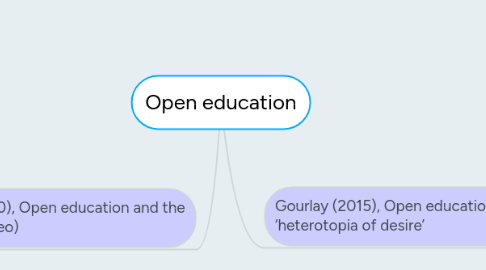
1. Gourlay (2015), Open education as a ‘heterotopia of desire’
1.1. Downes "utopian" view of OER as "a system of society and learning" where knowledge and learning are "public goods"
1.1.1. Latour argument of over- application of radical doubt and critique leading to conspiracy theories
1.1.2. OER perception that OERs are "inherently anti-hierarchical" and challenge to traditional university
1.1.2.1. Instruction (directed) serves the providers while construction (self-directed) serves the learners
1.1.3. Three issues with utopian view: 1. Rejection of established expertise and critical interaction 2. Rejection of progression through levels of knowledge 3. Rejection of teaching as hierarchical and oppressive
1.2. OER aligns with Foucault "heterotopia" which are "enacted utopias".
1.2.1. Idealised "fantasy" of dissociation with the mainstream
1.2.2. Real sites which are "simultaneously represented, contested, and inverted", e.g. a retirement home (physical world example)
1.2.3. Heterotopias can seem to be pure but hide exclusions
1.2.4. "Heterotopias of desire" - interpretation of viewpoint put forward by passionate advocates of OERs
1.3. Insufficient evidence for OERs to be as revolutionary as proponents such as Downes suggest
1.3.1. Qualitative research required on experiences of OER
1.3.2. Critique based on research would follow on from this
2. Wiley (2010), Open education and the future (video)
2.1. Role of openness in education
2.1.1. Only means of doing education
2.1.2. Expertise is nonrivalrous (see Thomas Jefferson quote)
2.1.3. Education is the relationship of sharing
2.2. Open
2.2.1. Generous, giving, sharing
2.2.2. Four Rs: reuse, redistribute, revise, remix
2.2.3. Overcoming self-centredness (the inner two-year-old)
2.3. Unprecedented capacity to share
2.3.1. Internet is an "indescribable advance"
2.3.2. Danger of stricter controls against internet as there were with the invention of the printing press pre-Reformation
2.4. Education on verge of its own Reformation
2.4.1. Powerful new media and technology
2.4.2. Ravenous demand
2.4.3. Outdated thinking reinforced by law
